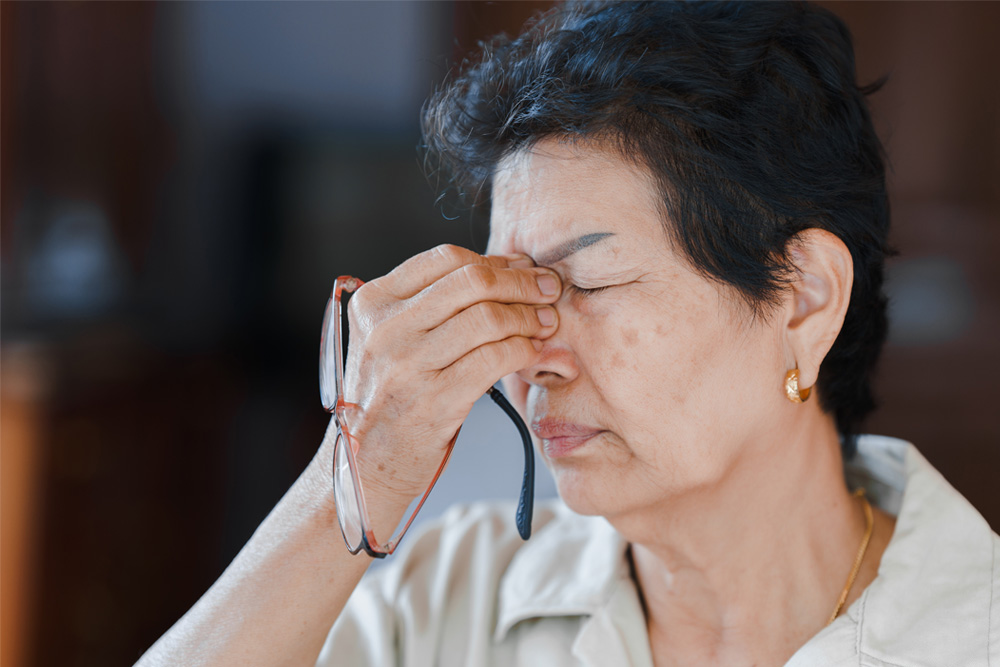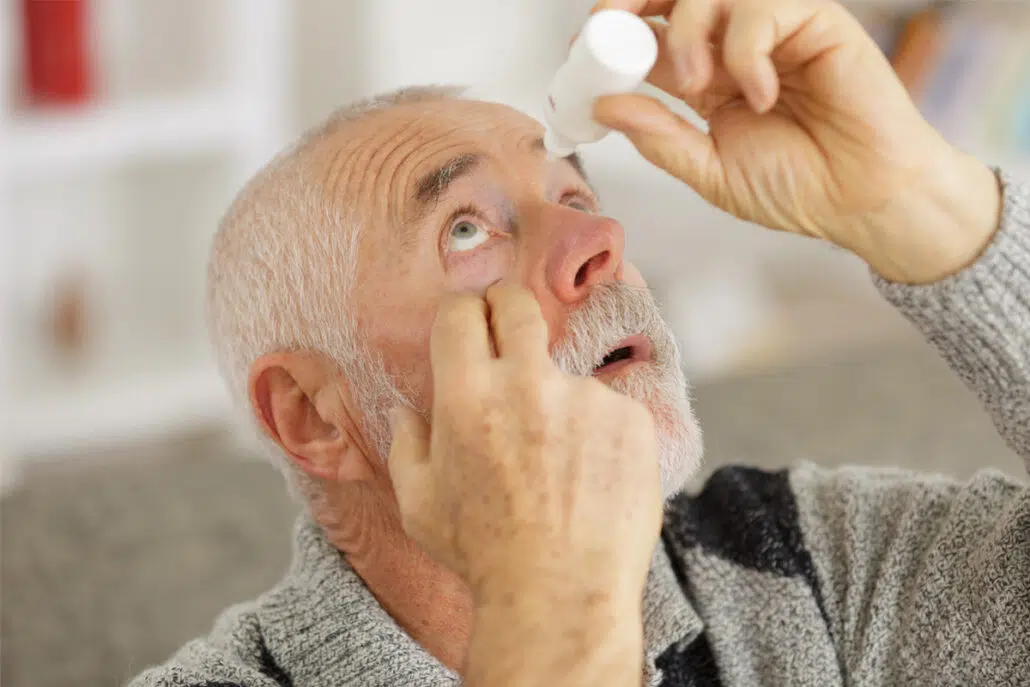Have you ever wondered about the intricate connection between glaucoma and allergic conjunctivitis? In this article, we dissect this complex relationship and give insights into these common eye conditions, highlighting ocular hypertension, a shared risk factor. Gain knowledge on how allergic eye conditions such as conjunctivitis can influence glaucoma and explore various methods of reducing eye pressure. Are you prepared to step into a world where the eye isn’t just a window to the soul but a fascinating web of interconnected health issues? Let’s dive in.

The Connection Between Glaucoma and Allergic Conjunctivitis
Amidst eye diseases, glaucoma stands out due to the crucial role pressure plays in its development and progression. On the other hand, allergic conjunctivitis is a common condition that leads to redness and inflammation of the eyes. However, the connection between these two might not be so obvious.
Studies suggest that the inflammation caused by allergic conjunctivitis can potentially increase pressure in the eyes, a known risk factor for glaucoma. Thus, long-term uncontrolled allergic inflammation might theoretically contribute to the development or progression of glaucoma.
Understanding Glaucoma
Glaucoma is a group of eye conditions that damage the optic nerve, often due to high pressure or eye injuries. This pressure results from a blockage of the drainage system in the eye, which leads to a buildup of fluid. If the pressure is too high, or the optic nerve is too susceptible to damage, the nerve fibers gradually die, leading to permanent vision loss. Early detection and management of elevated pressure leads to improved outcomes in glaucoma treatment.
The following characteristics are more prone to glaucoma :
- Family history of glaucoma (Hispanic, Asian, or African descent)
- People with diabetes
- High blood pressure
- Heart disease
- Sickle cell anemia
Ocular Hypertension: A Risk Factor for Glaucoma
Ocular hypertension, characterized by elevated intraocular pressure levels, significantly contributes to glaucoma. Though not all individuals with ocular hypertension develop glaucoma, the increase in pressure enhances the vulnerability, particularly in the absence of proper medication. A combination of various factors such as genetic predisposition, accumulated fluid, and aging may also play a part in developing this condition. However, the role of pressure as a primary risk factor is unequivocal.
About Allergic Conjunctivitis
Allergic conjunctivitis is an eye inflammation triggered by allergens like pollen, dust mites, or animal dander. The eye responds to these allergens by releasing histamine, a compound leading to itching, redness, swelling, and watery eyes. Chronic or long-standing allergic conjunctivitis might potentially affect the eye’s drainage system, leading to an increase in intraocular pressure. Hence, managing eye allergies can be a crucial aspect of controlling pressure-related eye diseases like glaucoma.
Impact of Allergic Eye Conditions on Glaucoma
Ocular allergies, notably allergic conjunctivitis, exert a substantial impact on ocular pressure, potentially aggravating glaucoma. The eye’s response to allergens often involves inflammation accompanied by increased pressure. Glaucoma occurs due to damage to the optic nerve due to pressure buildup in the eye. Higher pressure levels in the eye can directly accelerate this damage, thereby worsening glaucoma.
What Increases the Eye Pressure?
Reduced drainage or overproduction of aqueous humor, the eye’s clear fluid, contributes to increased pressure. Inflammation triggered by allergic reactions can block the eye’s drainage system, leading to aqueous humor accumulation.
Patients experiencing allergic eye conditions have reported heightened discomfort accompanied by ocular pressure surges during allergy seasons. The regular use of antihistamines and decongestants to control allergic symptoms can also impact ocular pressure, further contributing to certain types of glaucoma.
Effective Reduction of Eye Pressure Control
Controlling eye pressure is crucial, especially for those susceptible to glaucoma. Medical professionals advise various pressure-reducing strategies.

Medication Options
Medication is one effective method to manage intraocular pressure. Doctors recommend prescription eye drops as the first line of defense. These drops lower eye pressure by reducing the amount of fluid the eye produces or improving drainage. In people with allergic conjunctivitis, certain types of anti-allergy drops may also be prescribed to reduce the inflammation and pressure in the eyes.
In some cases, oral medication may be recommended to supplement eye drops if they’re not sufficient. These range from prostaglandin analogs, which ease fluid drainage in the eye, to beta-blockers and carbonic anhydrase inhibitors, which reduce fluid production. For patients with severe allergic conjunctivitis, allergy shots may be recommended as an additional form of treatment.
Finding the right balance is crucial. The medication should have more benefits than side effects. It needs to be tailored to the individual’s health, conditions, and possible interactions. Any eye discomfort should be reported immediately. This will help maintain the medication balance and manage the risk of glaucoma.
Natural Methods to Manage Eye Pressure
There are several non-pharmaceutical methods to manage eye pressure effectively.
- Regular exercise can reduce intraocular pressure
- Minimizing caffeine and sodium intake is also ideal, as these are known to spike intraocular pressure.
- A healthy diet rich in fruits, green leafy vegetables, and lean proteins can also play a significant role in maintaining optimal eye health.
- Practicing stress management techniques, such as yoga and meditation, aid in maintaining stable eye pressure
- Reducing screen time can also contribute to maintaining a normal eye pressure level
Consistent monitoring and management of eye pressure is crucial in preventing optic nerve damage and preserving vision. It is especially important to pay attention to a family history of glaucoma, as certain genetic risk factors can increase the likelihood of developing the condition. Regular eye exams play a vital role in early detection and treatment.
Living with Eye Allergies
Living with eye allergies can be difficult, but it doesn’t have to be unmanageable. It’s important to take a proactive approach to managing them and reducing their impact on the eyes. Here are some tips for living with this condition:
- Avoid known triggers (pet dander, dust mites, pollen, and other allergens)
- Wear protective eyewear
- Use cold compresses to reduce swelling and discomfort.
- Take your allergy medications
Consult with Allergy Experts
If you or someone you know is a glaucoma suspect or has an allergic disease, it is important to visit Becker ENT & Allergy for comprehensive health care. Our dedicated team of experts specializes in the diagnosis and treatment of eye allergies, so you can be sure that you are receiving the best possible care. We utilize medical approaches to ensure that your eyes stay healthy. Contact us today to learn more about how we can help you manage your condition and take control of your long-term eye health.

